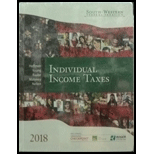
South-western Federal Taxation 2018: Individual Income Taxes
41st Edition
ISBN: 9781337385886
Author: William H. Hoffman, James C. Young, William A. Raabe, David M. Maloney, Annette Nellen
Publisher: Cengage Learning
expand_more
expand_more
format_list_bulleted
Question
Chapter 2, Problem 17DQ
To determine
Explain the appeal procedure under the given assumptions.
Expert Solution & Answer
Want to see the full answer?
Check out a sample textbook solution
Students have asked these similar questions
Problem No. 2
The trial balance of Cleint Lumanao Nacho Supplies on February 10, 2025, before accepting Shila Tajonera as
partner is shown as follows:
Account Title
Debit
Credit Ato
Cash
reening smuo P 100,000
Accounts Receivable
250,000
Allowance for Uncollectible Accounts
P 20,000 o
Merchandise Inventory
Equipment
Accumulated Depreciation
Accounts Payable
Notes Payable
120,000
275,000
55,000
50,000
82,000
538,000
Lumanao, Capital
Total
P 745,000
P 745,000
Tajonera offered to invest cash to get a capital credit equal to one-half of Lumanao's capital after giving effect to the
adjustments below. Lumanao accepted the offer.
Valuation of some of the assets and liabilities of Lumanao, as agreed by the partners, are the following:
• The merchandise is to be valued at P93,000.
The accounts receivable is estimated to be 90% collectible.
• The equipment is to be valued at P200,000.
The partners also agreed that the name of the partnership will be Nacho Business.
Required:
1. In the books of…
If data is unclear in image or image blurr then comment.
Solve correctly without using ai
Chapter 2 Solutions
South-western Federal Taxation 2018: Individual Income Taxes
Ch. 2 - Prob. 1DQCh. 2 - Why do taxpayers often have more than one...Ch. 2 - Prob. 3DQCh. 2 - Prob. 4DQCh. 2 - Prob. 5DQCh. 2 - Prob. 6DQCh. 2 - Rank the following items from the lowest to...Ch. 2 - Prob. 8DQCh. 2 - Prob. 9DQCh. 2 - Prob. 10DQ
Ch. 2 - Prob. 11DQCh. 2 - Prob. 12DQCh. 2 - Prob. 13DQCh. 2 - Prob. 14DQCh. 2 - Prob. 15DQCh. 2 - Prob. 16DQCh. 2 - Prob. 17DQCh. 2 - Prob. 18DQCh. 2 - Prob. 19DQCh. 2 - Prob. 20DQCh. 2 - Prob. 21DQCh. 2 - Prob. 22DQCh. 2 - Prob. 23DQCh. 2 - Prob. 24DQCh. 2 - Prob. 25DQCh. 2 - Prob. 26DQCh. 2 - Prob. 27DQCh. 2 - Prob. 28DQCh. 2 - Prob. 29DQCh. 2 - Prob. 30DQCh. 2 - Prob. 31DQCh. 2 - For her tax class, Yvonne must prepare a research...Ch. 2 - Prob. 33DQCh. 2 - Prob. 34DQCh. 2 - Prob. 35DQCh. 2 - Prob. 36DQCh. 2 - Prob. 37PCh. 2 - Prob. 38PCh. 2 - Prob. 39PCh. 2 - Prob. 40PCh. 2 - Prob. 41PCh. 2 - Using the legend provided, classify each of the...Ch. 2 - Prob. 43PCh. 2 - Prob. 1RPCh. 2 - Prob. 2RPCh. 2 - When Oprah gave away Pontiac G6 sedans to her TV...Ch. 2 - Prob. 4RPCh. 2 - (1) Go to taxalmanac.org, and use the website to...
Knowledge Booster
Similar questions
- Give solution correctly no chatgptarrow_forwardProblem No. 1 On January 1, 2025, Manuel Cruz and Sherimae Diasalo agreed to form a partnership that will manufacture and sell biscuits. The partnership agreement specified that Cruz is to invest cash of P1,000,000 and Diasalo is to contribute land and building to serve as the office and factory of the business. The following amounts are applicable to the property of Diasalo: Acquisition Cost Fair Market Value Land Building P1,000,000 500,000 P1,500,000 850,000 During the formation, it was found out that Cruz has accounts receivable amounting to P70,000 and the partners agreed that it will be assumed by the partnership. The name of the partnership will be Fita Pan. Required: 1. Prepare journal entry to record: a. The investment of Cruz to the partnership b. The investment of Diasalo to the partnershipood relay ni 000,219 2. Prepare the statement of financial position of the partnership as of January 1, 2025 Problem No. 2 The trial balance of Cleint Lumanao Nacho Supplies on February…arrow_forwardA company's stock price is $80, with earnings per share (EPS) of $10 and an expected growth rate of 12%.arrow_forward
- Kazama owns JKL Corporation stock with a basis of $20,000. He exchanges this for $24,000 of STU stock and $8,000 of STU securities as part of a tax-free reorganization. What is Kazama's basis in the STU stock?arrow_forwardKensington Textiles, Inc. manufactures customized tablecloths. An experienced worker can sew and embroider 10 tablecloths per hour. Due to the repetitive nature of the work, employees take a 10-minute break after every 10 tablecloths. Additionally, before starting each batch of 10 tablecloths, workers spend 8 minutes cleaning and setting up their sewing machines. Calculate the standard quantity of direct labor for one tablecloth.arrow_forwardSolvearrow_forward
- Problem: The bank statement balance of $7,000 does not include a check outstanding of $1,000, a deposit in transit of $275, and another company's $250 check erroneously charged against your firm's account. The reconciled bank balance is__?arrow_forwardGiven step by step explanation general accounting questionarrow_forwardQuick answer of this accounting questionsarrow_forward
arrow_back_ios
SEE MORE QUESTIONS
arrow_forward_ios
Recommended textbooks for you
 Individual Income TaxesAccountingISBN:9780357109731Author:HoffmanPublisher:CENGAGE LEARNING - CONSIGNMENT
Individual Income TaxesAccountingISBN:9780357109731Author:HoffmanPublisher:CENGAGE LEARNING - CONSIGNMENT



Individual Income Taxes
Accounting
ISBN:9780357109731
Author:Hoffman
Publisher:CENGAGE LEARNING - CONSIGNMENT


